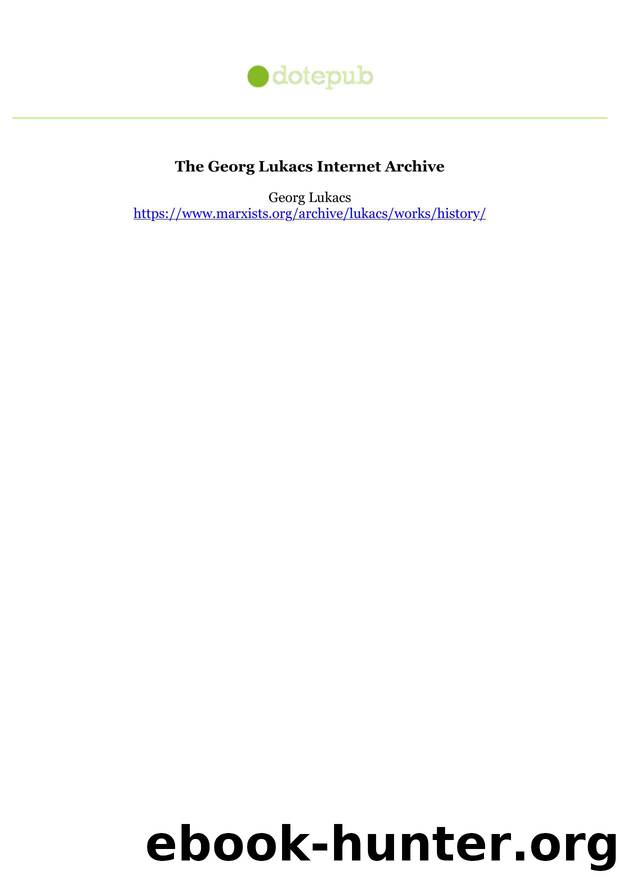History and Class Conciousness by Georg Lukács

Author:Georg Lukács [Lukacs, Georg & Lukács, Georg]
Language: eng
Format: epub
Published: 0101-01-01T00:00:00+00:00
2.
Classical philosophy is indebted for its wealth, its depth and its boldness no less than its fertility for future thinkers to the fact that it narrowed the problem down, confining it within the realm of pure thought. At the same time it remains an insuperable obstacle even within the realm of thought itself. That is to say, classical philosophy mercilessly tore to shreds all the metaphysical illusions of the preceding era, but was forced to be as uncritical and as dogmatically metaphysical with regard to some of its own premises as its predecessors had been towards theirs. We have already made a passing reference to this point: it is the – dogmatic – assumption that the rational and formalistic mode of cognition is the only possible way of apprehending reality (or to put it in its most critical form: the only possible way for ‘us’), in contrast to the facts which are simply given and alien to ‘us’. As we have shown, the grandiose conception that thought can only grasp what it has itself created strove to master the world as a whole by seeing it as self-created. However, it then came up against the insuperable obstacle of the given, of the thing-in-itself. If it was not to renounce its understanding of the whole it had to take the road that leads inwards. It had to strive to find the subject of thought which could be thought of as producing existence without any hiatus irrationalis or transcendental thing-in-itself. The dogmatism alluded to above was partly a true guide and partly a source of confusion in this enterprise. It was a true guide inasmuch as thought was led beyond the mere acceptance of reality as it was given, beyond mere reflection and the conditions necessary for thinking about reality, to orientate itself beyond mere contemplation and mere intuition. It was a source of confusion since it prevented the same dogmatism from discovering its true antidote, the principle that would enable contemplation to be overcome, namely the practical. (The fact that precisely for this reason the given constantly re-emerges as untranscended in its irrationality will be demonstrated in the course of the following account.)
In his last important logical work [19] Fichte formulates the philosophical starting-point for this situation as follows: “We have seen all actual knowledge as being necessary, except for the form of ‘is’, on the assumption that there is one phenomenon that must doubtless remain as an absolute assumption for thought and concerning which doubt can only be resolved by an actual intuition. But with the distinction that we can perceive the definite and qualitative law in the content of one part of this fact, namely the ego-principle. Whereas for the actual content of this intuition of self we can merely perceive the fact that one must exist but cannot legislate for the existence of this one in particular. At the same time we note clearly that there can be no such law and that therefore, the qualitative law required
Download
This site does not store any files on its server. We only index and link to content provided by other sites. Please contact the content providers to delete copyright contents if any and email us, we'll remove relevant links or contents immediately.
| Anarchism | Communism & Socialism |
| Conservatism & Liberalism | Democracy |
| Fascism | Libertarianism |
| Nationalism | Radicalism |
| Utopian |
The Secret History by Donna Tartt(16623)
The Social Justice Warrior Handbook by Lisa De Pasquale(11489)
Thirteen Reasons Why by Jay Asher(7788)
This Is How You Lose Her by Junot Diaz(5772)
Weapons of Math Destruction by Cathy O'Neil(5037)
Zero to One by Peter Thiel(4824)
The Myth of the Strong Leader by Archie Brown(4789)
Promise Me, Dad by Joe Biden(4447)
Beartown by Fredrik Backman(4419)
Stone's Rules by Roger Stone(4415)
How Democracies Die by Steven Levitsky & Daniel Ziblatt(4399)
The Fire Next Time by James Baldwin(4343)
100 Deadly Skills by Clint Emerson(4079)
A Higher Loyalty: Truth, Lies, and Leadership by James Comey(4033)
Rise and Kill First by Ronen Bergman(4012)
The David Icke Guide to the Global Conspiracy (and how to end it) by David Icke(3882)
The Farm by Tom Rob Smith(3872)
Secrecy World by Jake Bernstein(3782)
The Doomsday Machine by Daniel Ellsberg(3731)
